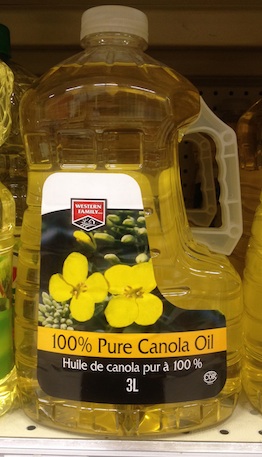Quick links
canola
< Can(adian) o(il), l(ow) a(cid), after formations in -ola
DCHP-2 (Aug 2012)
Spelling variants:Canola;
n. — Agriculture
a variety of rapeseed grown in North America.
Type: 1. Origin — In the early 1970s, canola was bred from rapeseed by researchers at the University of Manitoba and was named with the acronym some years later (see the 1979 quotations). Canola is of very high frequency in Canada in comparison to other countries (see Chart 1).
See also COD-2, s.v. "canola", Gage-3, s.v. "Canola", which is marked "Cdn. Trademark", ITP Nelson, s.v. "canola", and OED-3, s.v. "canola", which is marked as "orig. Canad.".
See also COD-2, s.v. "canola", Gage-3, s.v. "Canola", which is marked "Cdn. Trademark", ITP Nelson, s.v. "canola", and OED-3, s.v. "canola", which is marked as "orig. Canad.".
Quotations
1979
But Maurice Taylor, Mayor of the Sasketchewan rapeseed centre of Tisdale, said yesterday "I think we'll still call it rape," on learning that rapeseed is expected to be renamed canola.
1979
A suggested new name is "Canola," a shortened form of Canadian oil (ola meaning oil), association member Ken Sarsons of Saskatoon said last night. "There will still be rapeseed," he said, but Canola will stand for an improved and refined rapeseed, which represented 40 per cent of Canada's production last year.
1989
Take the gene that allows a flounder to keep from freezing at the ocean bottom, stick it onto the DNA of canola. Eureka. The rapeseed starts producing the flounder's personal antifreeze.
1999
Indeed, the European Union has banned the importation of Canadian canola because of safety concerns over genetic manipulation.
2008
Asked to comment on the wheat board's lofty wheat price projections, Martin said he felt he could make even more money this year growing malt barley, canola, flax or field peas.
n. & adj. — Food & Drink
canola oil; the cooking oil made from canola (see Image 1).
Type: 1. Origin — See meaning 1.
Quotations
1979
In 1978, Health and Welfare Canada gave canola oil a clean bill of health as a source of fat in Canadian diets.
1989
When choosing oils, prefer soft margarines (made from polyunsaturated oils) or, for cooking, polyunsaturated or monounsaturated oils such as canola (rapeseed), safflower, sunflower or olive oil.
1997
In 1996, Canadians consumed more canola oil products than any other country in the world. Eighty per cent of salad oils, 42 per cent of margarines and 56 per cent of shortenings produced in Canada now contain canola oil.
2008
Until recently, North American producers preferred domestically grown soy, corn, and canola oils. All that changed with the new labelling requirements. Suddenly, the world's largest economy developed a taste for palm oil.
References
- Gage-3
- ITP Nelson
- COD-2
- OED-3
Images
